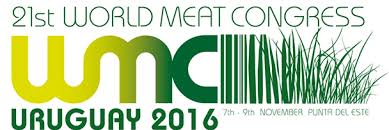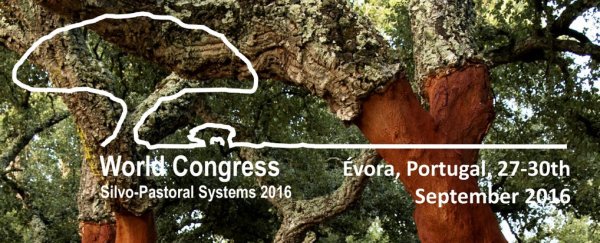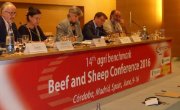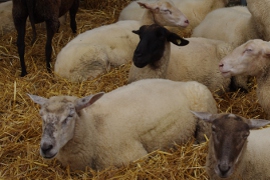|
Having trouble viewing this email? View it in your browser
|
|
November, 2016
|
|
Dear Readers,
|

|
before the year ends, we are happy to present you the 7th agri benchmark Beef and Sheep Newsletter. The 2016 season of global comparisons is completed, our data bases are updated for our partners and the main conclusions drawn. You can also see from this newsletter that we have participated in major international activities surrounding livestock production, practice change and sustainability.
|
|
This increased visibility and provided opportunities for further projects, mainly in the fields of practice change analysis against the background of sustainability. In our next newsletter we will report on progress in ongoing projects.
We hope you enjoy reading!
|
Claus Deblitz
Coordinator of the agri benchmark Beef and Sheep Network
|
Main findings of the Beef and Sheep Season 2016
|
|
The link below provides you with a short overview of the main findings from the 2016 season. Please note that this year we are not publishing a full report. The next report is planned for 2017.
|
|
Beef and Sheep Season 2016 (Link to external website)
|
21st World Meat Congress in Uruguay
|
|
Claus Deblitz, coordinator of the agri benchmark Beef and Sheep Network, took part in the 21st World Meat Congress in Uruguay. The congress was supposed to discuss a new global agenda of the sector.
|

|
|
As an invited speaker Claus Deblitz presented agri benchmark results stressing the importance of production system analyses. |
Global beef production – Why production systems are relevant for perspective analysis
(pdf, 3 MB, English Version)
|
Producción mundial de carne vacuna - Por qué los sistemas de producción son pertinentes para el análisis de las perspectivas
(pdf, 3,1 MB, Spanish Version)
|
|
During the World Meat Congress in Uruguay Claus Deblitz talked about latest developments in world meat production and trade. |
|
Interview Claus Deblitz at WMC 2016
|
|
In the Beef Committee, Ernesto Reyes presented his view on sustainability analysis, including results from common agri benchmark work. |
Silvopastoral systems (SPS) – A sustainable option for beef production
(pdf, 5,2 MB)
|
World Congress Silvo-Pastoral Systems in Evora
|
|
The Global Network on Silvo-Pastoral Systems (GNSPS) emerged as a proposal during the 5th meeting of the Global Agenda for Sustainable Livestock held in 2014, in Cali, Colombia. The GNSPS is intended to serve as the platform to exchange that information and to promote silvo-pastoral systems in different regions and scales of production. As a result of the first activities, the network has 62 stakeholders from 16 countries mainly from Latin America representing research centers, universities, farmer associations, governmental agencies, NGOs and the private sector.
|

|
|
For more information visit World congress - Silvopastoral Systems 2016 (Link to external website) |
|
agri benchmark were represented by Julian Chará and Claus Deblitz |
agri benchmark – a global approach to measure silvo-pastoral systems
(Claus Deblitz, pdf, 1,4 MB)
|
Advances in Silvo-Pastoral Systems in Latin America
(Pablo Peri, pdf, 3,2 MB)
|
Global Agenda for Sustainable Livestock
|
|
The 6th multi-stakeholder partnership meeting of the Global Agenda for Sustainable Livestock took part in Panama, 20-23 June, 2016. |

|
|
The Global Agenda for Sustainable Livestock is a partnership of livestock sector stakeholders committed to the sustainable development of the sector. agri benchmark has been an active member since 2013 and participates directly and indirectly in this activity, providing its core competence of measuring production systems, their economics and practice change. |
|
For more information visit Multi-Stakeholder Partnership Meeting of the Global Agenda for Sustainable Livestock (Link to external website) |
|
agri benchmark’s manager international institutions, Ernesto Reyes, presented in his role as chairman of the Focus Area 1 ‘Closing the efficiency gap’ the progress made in the action plans and pilot projects, in some of which agri benchmark plays a role. |
Closing The Efficiency Gap
(Ernesto Reyes, pdf, 9,8 MB)
|
|
Lesley Mitchell, International Head of Policy from World Animal Protection, presented her or-ganisation’s view on animal welfare and common actions and mentioned the cooperation with agri benchmark in the analysis of silvo-pastoral systems in Colombia. |
Integrating Animal Welfare In Sustainable Livestock
To Deliver The SDGS
(Lesly Mitchell, pdf, 711 KB)
|
|
Julián Chará, our Colombian partner from CIPAV presented the Global Network on Silvo-Pastoral Systems (see also the World Congress Silvo-Pastoral Systems) |
Global Network on Silvo-Pastoral Systems
(Julian Chará, pdf, 3,9 MB)
|
agri benchmark Beef and Sheep Network in the Media
|

|
The Beef and Sheep Conference 2016 took place in Cordoba, Spain, from June 09 to 16 June. The conference aroused a great deal of public interest.
|
|
|
Beef and sheep farming with lower profitability - Spain is moving towards exports of beef and sheep Press Release, English version
|
|
Rinder- und Schafzucht verliert an Wirtschaftlichkeit Press Release, German version
|
Did you know?
|
| In this section you find short information in regular intervals on particularities of production, sector, policy or trade in agri benchmark member countries.
|

|
Easy-to-apply classification of sheep production systems is now available
|
|
|
Sheep production systems largely differ depending on the available resources (natural, animal and human). These differences create difficulties when implementing farm comparison analysis. In order to provide a comprehensive framework for the analysis, a classification of farm production systems is required.
|
| » Read more
|
Having trouble viewing this email? View it in your browser
|